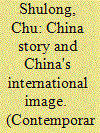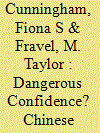|
|
|
Sort Order |
|
|
|
Items / Page
|
|
|
|
|
|
|
| Srl | Item |
| 1 |
ID:
142814


|
|
|
| 2 |
ID:
188659


|
|
|
|
|
| Summary/Abstract |
We study Chinese attitudes toward the United States, and secondarily toward Japan, Russia, and Vietnam, by analyzing social media discourse on the Chinese social media site, Weibo. We focus separately on a general analysis of attitudes and on Chinese responses to specific international events involving the United States. In general, we find that Chinese netizens are much more interested in US politics than US society. Their views of the United States are characterized by deep ambivalence; they have remarkably favorable attitudes toward many aspects of US influence, whether economic, political, intellectual, or cultural. Attitudes toward the United States become negative when the focus turns to US foreign policy – actions that Chinese netizens view as antithetical to Chinese interests. On the contrary, attitudes toward Japan, Russia, and Vietnam vary a great deal from one another. The contrast between these differentiated Chinese views toward the United States and other countries, on the one hand, and the predominant anti-Americanism in the Middle East, on the other, is striking.
|
|
|
|
|
|
|
|
|
|
|
|
|
|
|
|
| 3 |
ID:
168949


|
|
|
|
|
| Summary/Abstract |
Chinese views of nuclear escalation are key to assessing the potential for nuclear escalation in a crisis or armed conflict between the United States and China, but they have not been examined systematically. A review of original Chinese-language sources and interviews with members of China's strategic community suggest that China is skeptical that nuclear escalation could be controlled once nuclear weapons are used and, thus, leaders would be restrained from pursuing even limited use. These views are reflected in China's nuclear operational doctrine (which outlines plans for retaliatory strikes only and lacks any clear plans for limited nuclear use) and its force structure (which lacks tactical nuclear weapons). The long-standing decoupling of Chinese nuclear and conventional strategy, organizational biases within China's strategic community, and the availability of space, cyber, and conventional missile weapons as alternative sources of strategic leverage best explain Chinese views toward nuclear escalation. China's confidence that a U.S.-China conflict would not escalate to the use of nuclear weapons may hamper its ability to identify nuclear escalation risks in such a scenario. Meanwhile, U.S. scholars and policymakers emphasize the risk of inadvertent escalation in a conflict with China, but they are more confident than their Chinese counterparts that the use of nuclear weapons could remain limited. When combined, these contrasting views could create pressure for a U.S.-China conflict to escalate rapidly into an unlimited nuclear war.
|
|
|
|
|
|
|
|
|
|
|
|
|
|
|
|
|
|
|
|
|